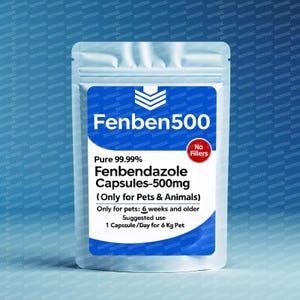fenbendazole: Potential Risks Pet Owners Must Watch For
Wiki Article
Recognizing the Advantages and Uses of Fenbendazole in Vet Medication
Fenbendazole has developed itself as a vital anthelmintic in veterinary medicine. Its ability to target different parasitical infections makes it an important tool for vets. The medication's mechanism interferes with vital mobile procedures in bloodsuckers, resulting in reliable therapy end results. Its security profile varies in between species, necessitating careful consideration in its use (fenbendazole 222). Recognizing these characteristics can clarify fenbendazole's more comprehensive ramifications in veterinary care and ongoing research study right into its prospective past typical applicationsDevice of Activity of Fenbendazole

Typical Parasitical Infections Treated With Fenbendazole
A selection of parasitic infections are efficiently treated with fenbendazole, making it a flexible alternative in veterinary medication. This anthelmintic representative is specifically efficient against nematodes, consisting of roundworms and hookworms, which generally impact pet dogs and cats. It is also used for the therapy of cestodes, such as tapeworms, supplying a broad range of action against both types of digestive tract bloodsuckers. Additionally, fenbendazole is valuable in handling infections caused by protozoa, particularly Giardia, which can lead to stomach distress in animals. Its efficiency reaches dealing with specific lungworms in dogs and felines, dealing with respiratory wellness worries connected to these parasites. In general, fenbendazole's capability to target multiple parasitic varieties makes it a valuable device in veterinary method, making sure the wellness and well-being of family pets affected by these usual infections.Safety and Effectiveness in Various Animal Types
The security and efficiency of fenbendazole differ amongst various pet varieties, underscoring the importance of species-specific considerations in veterinary medication. In canines, fenbendazole is usually well-tolerated and reliable against a series of gastrointestinal bloodsuckers, including roundworms and hookworms. For felines, nevertheless, its use is much less typical and may need mindful application as a result of prospective unfavorable reactions.In animals, such as livestock and lamb, fenbendazole demonstrates effectiveness versus numerous endoparasites, adding to boosted health and performance. However, the pharmacokinetics and potential adverse effects can vary significantly between varieties, necessitating careful examination by veterinarians.
Horses additionally react favorably to fenbendazole, particularly for treating strongyles and ascarids, though dose and administration courses have to be customized to their one-of-a-kind physiology. Subsequently, comprehending these distinctions is crucial for optimizing treatment end results and making sure animal well-being across diverse species.
Management and Dosage Standards
Proper management and dosage guidelines are vital for making best use of the therapeutic effects of fenbendazole while decreasing possible adverse effects. The dose commonly differs depending on the types being treated, the certain condition, and the formulation of fenbendazole utilized. fenbendazole 222. For dogs and pet cats, a common dosage is 50 mg/kg body weight, provided when daily for three successive days, yet veterinarians may adjust this based upon private health assessmentsIt is essential to provide fenbendazole with food to improve absorption and lessen intestinal distress. The drug is readily available in various forms, consisting of granules and paste, permitting adaptable administration options. Keeping an eye on the pet's response during more helpful hints and after treatment is a good idea to confirm effectiveness and security. Furthermore, vet support is vital to identify the ideal period of therapy based upon the kind of parasitic infection being resolved, assuring optimal outcomes for the pet's health and wellness.
Future Perspectives and Research Study on Fenbendazole
Research on fenbendazole continues to evolve, focusing on its prospective applications past traditional antiparasitic usages. Current research the original source studies have actually explored its performance in treating different forms of cancer cells, specifically in vet oncology. Initial data suggest that fenbendazole may inhibit the growth of lump cells and enhance the effects of various other chemotherapeutic agents.Additionally, scientists are examining its role in taking care of gastrointestinal problems in animals, highlighting its anti-inflammatory residential or commercial properties. The versatility of fenbendazole for different varieties elevates questions concerning its safety profiles and ideal application regimens in diverse populations.
As rate of interest expands, there is a requirement for extensive medical trials to develop evidence-based guidelines for these novel applications. Future research study may additionally investigate the mechanisms behind fenbendazole's results, potentially leading the way for innovative restorative approaches in vet medication. The ongoing expedition of fenbendazole might substantially boost treatment options for different veterinary conditions.

Regularly Asked Concerns
Is Fenbendazole Safe for Pregnant Animals?
The safety of fenbendazole for pregnant animals remains unclear. While some studies suggest minimal threat, vets commonly suggest caution and often suggest versus its use while pregnant unless the benefits plainly exceed potential risks.Can Fenbendazole Be Used in Livestock?
Fenbendazole is frequently used in livestock to treat numerous parasitical infections. fenbendazole capsules. Its efficiency against intestinal worms makes it a valuable anthelmintic, adding to improved wellness and performance in animals increased for food and fiberWhat Are the Adverse Effects of Fenbendazole?

The adverse effects of fenbendazole may include gastrointestinal disruptions, lethargy, and sensitive reactions. In rare cases, more serious reactions might happen, demanding mindful surveillance and consultation with a veterinarian throughout treatment.
How Does Fenbendazole Compare to Other Dewormers?
Fenbendazole provides broad-spectrum efficiency against numerous parasites, commonly comparing favorably to various other dewormers. Its one-of-a-kind mechanism targets various life phases, making it effective, while typically providing a positive security profile compared to choices offered on the market.Can Fenbendazole Be Utilized for Dealing With Cancer in Pets?
The potential of fenbendazole in treating cancer in pet dogs has garnered passion. Preliminary research studies recommend it may hinder cancer cells cell development, click for source however even more study is required to validate its effectiveness and security in veterinary oncology.Report this wiki page